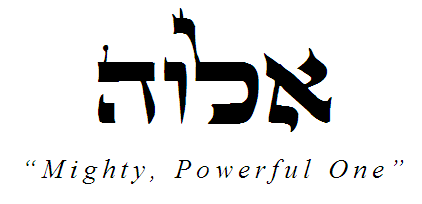|
Introduction
The word Eloah is the singular (or dual) of Elohim and appears more than 70 times in the Tanakh, primarily in more poetic passages. The root-meaning of the word is unknown. It is generally thought that the same divine name is found in Arabic (Ilah as singular "a god", as opposed to Allah meaning "the God" or "God") and in Aramaic (Elah), though note the term Allah is "borrowed" from the original language. In the Tanakh, the singular form is used in six places for heathen deities (e.g., 2 Chronicles 32:15; Daniel 11:37-8;), though in the majority of cases the name is used for the God of Israel.
Note that the final Hey uses a Mappiq, and the syllable uses the furtive patach (e-lo-ah).
Eloah and Constructs
For each name in the list below, I provide the following information:
- The Hebrew text for the name
- The most common English transliteration (in italics)
- A definition for the name, references to the Tanakh, and frequency information
- Additional comments, if applicable.
Eloah


Eloah. [basic form]
"God" (a singular form of Elohim) that appears over 70 times in the Tanakh.
References: Deut. 32:15; 2 Chr. 32:15; Neh. 9:17; Job 3:4, 23; 4:9; 5:17; 6:4, 8f; 9:13; 10:2; 11:5ff; 12:6; 15:8; 16:20f; 19:6, 21, 26; 21:9, 19; 22:12, 26; 27:3, 8, 10; 29:2, 4; 31:2, 6; 33:12, 26; 35:10; 37:15, 22; 39:17; 40:2; Ps. 18:32; 50:22; 114:7; 139:19; Prov. 30:5; Isa. 44:8; Dan. 11:37, 39; Hab. 3:3.
Eloah


Eloah. [basic form]
This is a (defective) spelling variant found in the Tanakh. Some think this form is dual whereas Elohim is considered plural.
The God of Jacob


Eloah Ya'akov.
The God of Jacob. Psalm 114:7.
The God of Forgiveness


Eloah Selichot.
The God of Forgiveness. Neh. 9:17.
Additional Information
Here is some additional Information about the Name Eloah (from the Theological Wordbook of the Old Testament):
Eloah. God, god (ASV, RSV similar). The exact relationship between this name for God in Scripture and El or Elohim is disputed and far from settled. It occurs in some of the oldest OT poetry (Deut 32:15, 17) and very frequently (forty-one times) in the debates between Job (an ancient believer) and his friends. It appears therefore to be an ancient term for God which was later dropped for the most part until the time of the exile and after, when there was great concern for a return to the more ancient foundations. It is not frequently used outside Job. It occurs once in Isa, once in Prov, twice in Hab, four times in the Ps, and then in the postexilic books: 2Chr, Neh, and Dan, a total of five times.
Marvin H. Pope in his Book, El in the Ugaritic Texts, has noted that Eloah never has the article although it is once determined by the suffix (Hab 1:11) and found once in the construct (Psa 114:7). He further points out that it never occurs in combination with another divine name.
We shall first look at the usage outside Job. Three times it occurs in parallel to "rock" as a descriptive term for God (Deut 32:15; Psa 18:31 [H 32]; Isa 44:8). Once it is found in a context in which God is described as a shield to those who take refuge in him (Prov 30:5). Three times it is used in a context of terror for sinners (Psa 50:22; Psa 114:7; Psa 139:19).
This would suggest that the term conveyed to God's people comfort and assurance while conveying fear to their enemies. The concepts of strength and might conveyed by the term are further seen in the three successive verses of Daniel's vision about the great anti-god (Dan 11:37-39). Here the anti-god's god (Eloah) seems to be "strength" itself. In Hab 1:11 the term is used similarly.
In Hab 3:3, the prophet speaks of Eloah coming from Teman. In Job, Teman is associated with one of Job's three friends, Eliphaz (Job 4:1). Interestingly, the term Eloah, used for God, is predominantly used in Job by Job and Eliphaz in their debating. Only in one context does Zophar use the term (Job 11:5-7). Bildad never does. Of course Elihu uses it, perhaps in imitation of the former speakers (six times in chapters 33-37). God himself, in speaking to Job, uses the term twice: once in a context of his providence and once in parallel to "the Almighty" (see our discussion on the concept of might associated with the name).
This term for God was usually clearly used for Israel's God, the true God. This is evident from the fact that the Levites in the postexilic period used the term in quoting the descriptive revelation of God given in Exo 34:6-7, where the original revelation to Moses had used El and Yahweh (Neh 9:17).
The Hebrew word is quite similar to the Aramaic Elah, the usual name for God in Biblical Aramaic. It has been suggested that the term has come, via Aramaic, from two elements: El and Ah (a shortened form of Ahyeh, Exo 3:14, "I shall be," the designation of Yahweh in the first person; Feigin, Samuel I., "The Origin of Eloh, 'God', in Hebrew," JNES 3: 259). This suggests the possibility that originally two separate gods were involved and later combined. Such a suggestion does not seem likely inasmuch as the term is in Scripture almost always used as a designation of the true God.
It is probably akin to the term El. It was in use quite early, then, after a period of neglect among God's people, the term was revived to a limited use perhaps through the contacts with Aramaic, where a similar term was in constant use.
Source: The Theological Wordbook of the Old Testament, by R. Laird Harris, Gleason L. Archer Jr., Bruce K. Waltke, originally published by Moody Press of Chicago, Illinois, Copyright © 1980.
<< Return
|

